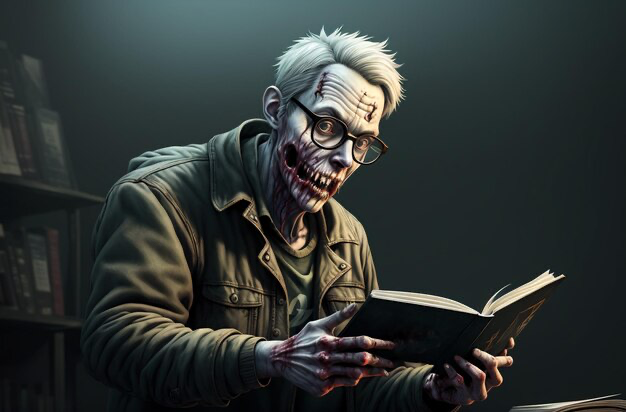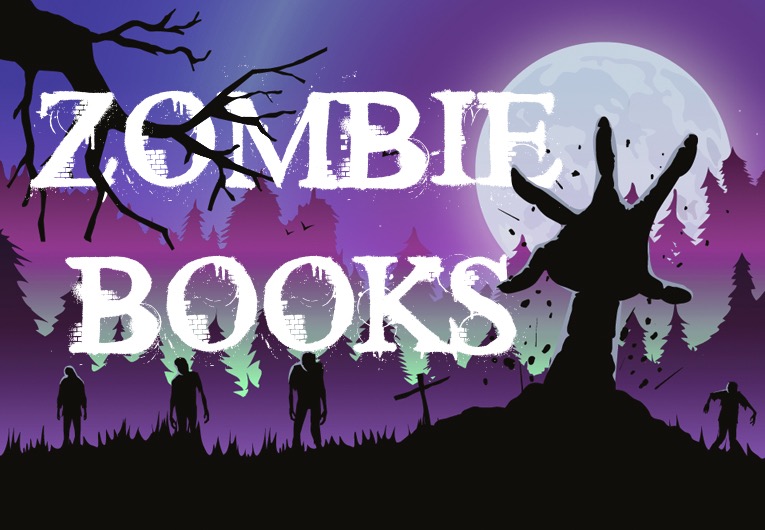The zombie genre has captivated readers with its unique blend of horror, suspense, and often, social commentary. From the desolate streets in Max Brooks’ World War Z to the heart-wrenching survival tale in Courtney Summers’ This is Not a Test, each book offers a distinct perspective on the zombie apocalypse. These stories are not just about the undead; they’re about humanity, resilience, and often, a critique of society.
World War Z: A Global Perspective on Zombies
Max Brooks’ World War Z is not just a novel; it’s an epic tapestry of human experience in the face of an overwhelming zombie apocalypse. This book stands apart for its unique narrative style and the depth of its social commentary. The interview-style format Brooks employs allows for a diverse range of voices to be heard, each telling their own story of survival, loss, and resilience. This method of storytelling offers a panoramic view of a world in chaos, yet it also zooms in on individual human struggles, making the global crisis deeply personal.
Key Aspects of World War Z
- Diverse Global Responses: The novel brilliantly showcases how different countries and cultures react to the same catastrophic event, offering a varied tapestry of resilience, ingenuity, despair, and adaptation;
- Humanity and Resilience: Through its multitude of voices, the book explores the depths of human tenacity, the complexity of societal structures in crisis, and the unyielding spirit of survival against all odds;
- Political and Social Commentary: Each narrative thread weaves into a larger picture of how governments, military forces, and civilians respond, providing a critique of real-world issues like disaster management and international politics.
The Walking Dead: More Than Just a Comic Series
Robert Kirkman’s The Walking Dead, while popularized by its television adaptation, is a profound comic series that dives deep into the psychology of survival in a post-apocalyptic world. It is a narrative that goes beyond the flesh-eating zombies to explore the complexities of human nature, morality, and the essence of society when stripped down to survival.
Key Elements of The Walking Dead
- Character Development: The series is notable for its richly developed characters, each with their own backstory, evolving motivations, and moral dilemmas. This depth makes the narrative compelling and emotionally engaging;
- Societal Reconstruction and Morality: It examines the reconstruction of society from its very foundations, posing questions about what it means to build a new world on the ruins of the old one, especially when faced with constant threats both from within and outside the community.
Generation Dead and Teen Zombies
Daniel Waters’ Generation Dead brings a fresh perspective to zombie literature by focusing on teenage zombies. This novel blends the traditional elements of a zombie apocalypse with the complexities of teenage life, making it a unique and intriguing read.
Notable Features of Generation Dead
- Teenage Perspective: The novel offers a glimpse into the zombie genre through the lens of youth, adding a layer of relatability and freshness to the narrative;
- Themes of Inclusivity and Acceptance: Waters tackles issues of marginalization and prejudice, using the metaphor of zombies to explore societal attitudes towards those who are different.
Warm Bodies: A Zombie Love Story
Isaac Marion’s Warm Bodies is a groundbreaking novel in the zombie genre. It reimagines the narrative by introducing elements of romance and humor, set against the grim backdrop of a zombie apocalypse.
Highlights of Warm Bodies
- Romance Amidst Ruin: The novel presents a unique love story between a zombie and a human, challenging the conventional boundaries of the genre;
- Balancing Darkness with Humor: Marion skillfully juxtaposes the bleakness of a post-apocalyptic world with moments of light-heartedness and humor.
Breathers: A Zombie’s Lament – Society from a Zombie’s Perspective
S.G. Browne’s Breathers is a unique take on the zombie genre, offering a narrative from the perspective of the zombies themselves. This dark comedy provides a satirical look at society and how it treats those who are different.
Distinct Aspects of Breathers
- Zombie Perspective: The novel flips the traditional zombie story by giving the undead a voice and agency, providing a fresh and engaging narrative;
- Social Satire: Browne uses humor to critique societal norms and attitudes, particularly towards marginalized groups.
Love & The Zombie Apocalypse: A Teen’s Survival Guide
Chelsea Luna’s novel uniquely combines the excitement of a zombie apocalypse with the relatable experiences of young love. It’s a tale that resonates particularly with young adults, capturing the essence of adolescence against the backdrop of a survival struggle.
Key Features
- Young Love in Extreme Conditions: The novel explores the complexities and nuances of teenage relationships in the midst of a life-threatening crisis;
- Adolescent Strength and Adaptability: Luna highlights the resilience and resourcefulness of teenagers when faced with extraordinary challenges.
This is Not a Test: The Psychological Impact of the Apocalypse
Courtney Summers’ This is Not a Test is a poignant exploration of the psychological impact of living through a zombie apocalypse. The novel stands out for its deep emotional resonance and its focus on the mental and emotional struggles of its characters.
Significant Elements
- Emotional Depth: Summers provides a stark and honest depiction of the psychological toll of surviving in a world overrun by zombies;
- Importance of Mental Resilience: The narrative emphasizes that survival is not only about physical endurance but also about maintaining mental and emotional strength in the face of adversity.
The Rising: A New Take on Zombie Origins
Brian Keene’s The Rising breathes new life into the zombie genre by incorporating elements of science fiction and horror. This novel stands out for its unique take on the origins of zombies and its exploration of existential themes.
Distinct Features
- Science Fiction Approach to Zombie Outbreak: Keene introduces an innovative explanation for the zombie apocalypse, combining elements of horror with speculative science;
- Existential Questions: The narrative delves into deep philosophical discussions about life, death, and humanity’s place in the universe.
Monster Island: A Desperate Quest in a Zombie-Infested World
David Wellington’s Monster Island takes the reader on an intense journey through a zombie-infested Manhattan. The novel is unique in its urban setting and its exploration of both external and internal conflicts.
Highlights
- Survival in an Urban Landscape: The setting in Manhattan adds a distinct and vivid backdrop to the survival narrative, transforming familiar cityscapes into eerie battlegrounds;
- Internal Struggles and Conflicts: Wellington delves into the psychological battles faced by the characters, paralleling the physical threats posed by the zombies.
The Reapers are the Angels: A Poetic Journey Through a Ravaged World
Alden Bell’s The Reapers are the Angels is a standout in zombie literature for its lyrical prose and philosophical depth. This novel presents the zombie apocalypse as a canvas for exploring profound themes about life, death, and the essence of humanity.
Key Aspects
- Literary Merit: Bell’s poetic style elevates the narrative beyond typical genre conventions, offering a deeply immersive and reflective reading experience;
- Philosophical Exploration: The book prompts readers to contemplate existential themes, considering the nature of existence and the human condition in a drastically altered world.

Dead City: A Gritty Tale of Survival
Joe McKinney’s Dead City plunges readers into a harrowing survival story set in a zombie-infested San Antonio. This novel stands out for its intense, action-packed narrative and its realistic portrayal of a sudden zombie outbreak. McKinney, a former police officer, brings a unique authenticity to the story, especially in depicting law enforcement and emergency responses in crisis situations.
Key Features of Dead City
- Realistic Emergency Response: The novel shines in its realistic portrayal of how police and emergency services might react to a sudden, inexplicable crisis;
- Fast-Paced Action: McKinney masterfully creates a sense of urgency and suspense, keeping readers on the edge of their seats throughout the story;
- Personal Struggle for Survival: The protagonist’s journey is not just about physical survival, but also about maintaining humanity and moral values in the face of unspeakable horror.
The Forest of Hands and Teeth: A Young Adult Perspective
Carrie Ryan’s The Forest of Hands and Teeth is a remarkable entry in the zombie genre, targeting a young adult audience. This novel is set in a world long after a zombie apocalypse, where a small community lives in isolation, surrounded by a forest full of the undead. The story is notable for its focus on personal discovery, coming-of-age themes, and the exploration of a life confined by fear and rules.
Distinct Elements of The Forest of Hands and Teeth
- Coming-of-Age Story: The protagonist’s journey from a sheltered life to confronting the horrors and truths of the outside world parallels the universal themes of adolescence and self-discovery;
- Exploration of Isolation and Control: The book delves into the effects of living in a controlled, fearful society and the human desire for freedom and truth;
- Romance and Emotional Depth: Ryan skillfully weaves a tale of love and emotional conflict into the narrative, adding a layer of depth to the post-apocalyptic setting.
Feed: A Unique Blend of Zombies and Technology
Mira Grant’s Feed presents an innovative blend of zombie fiction and a techno-thriller. Set in a near-future world where a zombie virus outbreak has occurred, the story follows a team of bloggers covering the presidential election. This novel is unique for its incorporation of technology and media into the traditional zombie narrative, exploring themes of information dissemination, truth, and conspiracy in a world where the undead are a reality.
Highlights of Feed
- Technology and Media Focus: Grant explores the role of technology, especially blogging and digital media, in a world recovering from a zombie apocalypse;
- Political Intrigue and Conspiracy: The novel intertwines a thrilling political plot with the constant threat of zombies, offering a fresh take on the genre;
- Exploration of Truth and Misinformation: Feed delves into the complexities of disseminating information in a crisis, the pursuit of truth, and the manipulation of media in a world filled with fear and uncertainty.
Robin Hobb’s Realm of the Elderlings: A Fantasy Counterpart to Zombie Fiction
While primarily recognized for her fantasy novels, Robin Hobb’s Realm of the Elderlings series can be seen as a thematic counterpart to the intense survival narratives found in zombie fiction. Although Hobb’s works do not feature zombies, they share similar themes of resilience, the exploration of human nature under duress, and the complexities of societal and political dynamics in times of crisis.
Best Robin Hobb Books
- Assassin’s Apprentice: The first book in the Farseer Trilogy, introducing readers to the young bastard Fitz and his journey into a world of court intrigue and ancient magic;
- Royal Assassin: Continues Fitz’s story, delving deeper into the complexities of court politics and his role as a royal assassin;
- Assassin’s Quest: Concludes the trilogy, with Fitz embarking on a quest that tests his limits and explores the bounds of loyalty and love.
By drawing parallels between the themes in Hobb’s fantasy works and those in zombie fiction, we can appreciate how different genres tackle similar fundamental human experiences. Hobb’s narratives, while set in a fantasy realm, resonate with the same intensity and depth found in the best zombie novels, making her works a compelling read for fans of character-driven, survival-themed literature.
Conclusion
The enduring popularity of zombie fiction lies in its ability to evolve and reflect societal fears and aspirations. Each of these books offers a unique window into the human psyche, making them much more than simple horror stories. They are reflections of our times, our fears, and our hopes.
